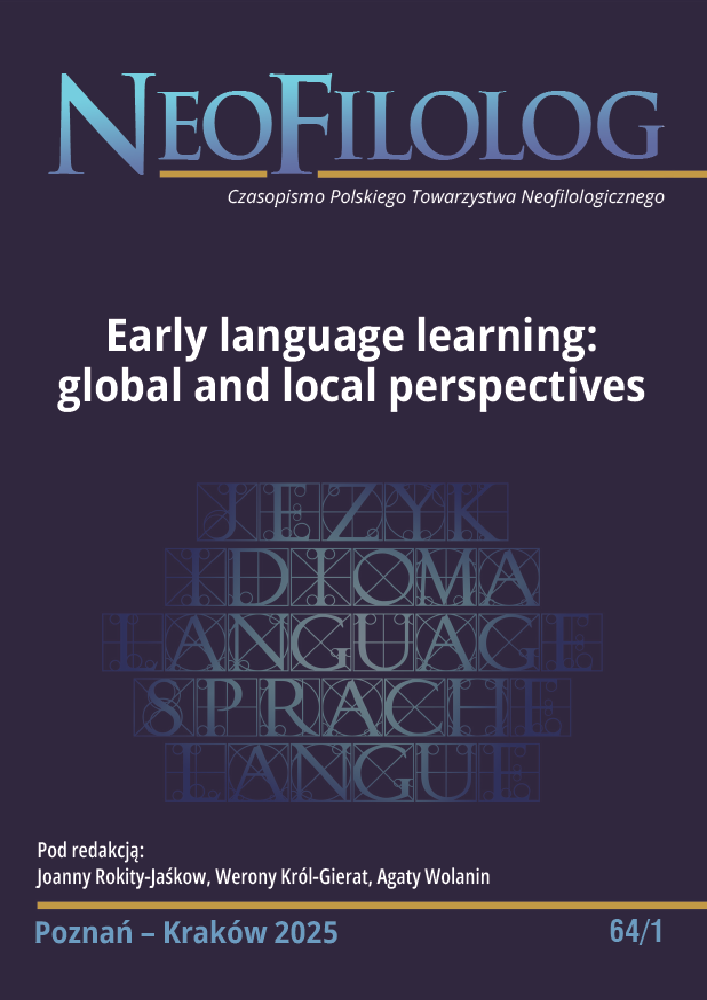Abstract
The article aims at exploring students’ perceptions of the significance of particular teachers’ competencies in early language education. In the first part, a literature review synthesizing diverse definitions of teacher competencies based on varied criteria is presented. The second part depicts the results of a quantitative study involving a survey undertaken at the University of Bialystok, with 54 fourth-year pedagogy students majoring in early education participating. The survey instrument comprised closed-ended questions categorized into six competencies. The findings revealed that, among psychological and pedagogical competencies, skills and knowledge in fostering student motivation were deemed vital (59.3%). Educational competencies highlighted the significance of teacher’s empathy, enthusiasm, and optimism (68.5%), while substantive competencies emphasized the importance of using the foreign language during lessons (63%). Intercultural competencies highlighted the importance of teacher’s tolerance and openness (65%), and methodological and didactic competencies identified knowledge and skills in the concept of early school foreign language teaching as critical (53.7%). Among diagnostic competencies, the ability to interpret and evaluate lessons, observe and assess student involvement in linguistic activities, and recognize and understand errors were equally important (51.9%). The research outcomes offer valuable insights into the perspectives of MA pedagogy students, shedding light on the competencies they deem essential for effective early language education.
Literaturhinweise
Andrzejewska E. (2008). Kompetencje nauczyciela języków obcych w edukacji wczesnoszkolnej. „Języki Obce w Szkole”, n. 4/2008, pp. 42–47.
Brewster J., Ellis G., Girard D. (2004), The primary English teacher’s guide. London: Penguin.
Cameron L. (2001), Teaching languages to young learners. Cambridge: Cambridge University Press. DOI: https://doi.org/10.1017/CBO9780511733109
Darling-Hammond L., Bransford J. (2005), Preparing teachers for a changing world: What teachers should learn and be able to do. San Francisco: Jossey-Bass.
Erenc-Grygoruk G. (2013), Nauczanie języków obcych w edukacji wczesnoszkolnej. Kraków: Impuls.
Fink A. (2003), The survey handbook. Thousand Oaks, California: SAGE Publications, Inc.
Journal of Laws. No. 98, item 433 (with amendments). https://isap.sejm.gov.pl/isap.nsf/DocDetails.xsp?id=WDU19910980433
Hargreaves A., Fullan, M. (2012), Professional capital: Transforming teaching in every school. New York: Teachers College Press.
Klimek L. (2016), Kompetencje diagnostyczne nauczyciela w kontekście pomocy psychologiczno-pedagogicznej w szkole. „Lubelski rocznik pedagogiczny”, t. XXXV, z. 1 – 2016, pp. 167–177. DOI: https://doi.org/10.17951/lrp.2016.35.1.167
Komorowska H., Krajka J. (2024), Trends in European language education policy on teacher education: teaching foreign languages to young learners. “Glottodidactica”, No 51(1), pp. 27–44. DOI: https://doi.org/10.14746/gl.2024.51.1.2
Kwaśnica R. (2004), Wprowadzenie do myślenia o nauczycielu, (in:) Kwieciński Z., Śliwerski B. (eds.), Pedagogika. Podręcznik akademicki, t. 2. Warszawa: Wydawnictwo Naukowe PWN, pp. 291–320.
Nosidlak K. (2021), Uczniowie klas ósmych i ich wizja dobrego nauczyciela języka obcego (DNJO) – ujęcie retrospektywne, (in): Rokita-Jaśkow, J., Nosidlak, K. (eds.), Nauczanie dzieci języków obcych – globalne wyzwania, lokalne rozwiązania. Kraków: Wydawnictwo Naukowe UP, pp. 205–221.
Nosiadlak K. (2024), Experienced learners from Generation Z and the traditional vision of the good language teacher: on the issue of teacher authenticity. “Neofilolog”, No 62(2), pp. 461–481. DOI: https://doi.org/10.14746/n.2024.62.2.8
Pfeiffer W. (2001), Nauka języków obcych. Od praktyki do praktyki, Poznań: Wagros.
Průcha J. (2006), Pedeutologia. (in:) Śliwerski B. (ed.) Pedagogika, t. 2: Pedagogika wobec edukacji, polityki oświatowej i badań naukowych. Gdańsk: Gdańskie Wydawnictwo Pedagogiczne, pp. 293–316.
Regulation of the Ministry of National Education of October 10, 1991. https://isap.sejm.gov.pl/isap.nsf/DocDetails.xsp?id=WDU19910980433
Regulation of the Minister of National Education and Sport of September 7, 2004. https://isap.sejm.gov.pl/isap.nsf/DocDetails.xsp?id=WDU20042072110&SessionID=2CD3230E9B96172D16214787176DBFCD6558220D
Regulation of the Minister of National Education of 14 February 2017 on the core curriculum for preschool education and the core curriculum for general education for primary school, including for students with moderate or significant intellectual disabilities, general education for vocational schools of the first degree, general education for special schools preparing for work and general education for post-secondary schools. https://isap.sejm.gov.pl/isap.nsf/DocDetails.xsp?id=wdu20170000356.
Richards J. C. (2010), Competence and performance in language teaching. Cambridge: Cambridge University Press.
Shulman L. S. (1987), Knowledge and teaching: Foundations of the new reform. “Harvard Educational Review”, No 57(1), pp. 1–22. DOI: https://doi.org/10.17763/haer.57.1.j463w79r56455411
Stec M. (2009), Nauczyciel języka obcego w edukacji wczesnoszkolnej, (in:) Sikora-Banasik D. (ed.), Wczesnoszkolne nauczanie języków obcych. Zarys teorii i praktyki. Warszawa: Centralny Ośrodek Kształcenia Nauczycieli, pp. 51–59.
Werbińska D. (2004), Skuteczny nauczyciel języka angielskiego – wnioski z badań. „Języki Obce w Szkole”, No 1/2004, pp. 78–80.
Werbińska D. (2011), Developing into an effective Polish teacher of English. Słupsk: Wydawnictwo Naukowe Akademii Pomorskiej w Słupsku.
Lizenz
Copyright (c) 2025 Anna Szuchalska

Dieses Werk steht unter der Lizenz Creative Commons Namensnennung - Keine Bearbeitungen 4.0 International.
Autoren:
Die Autoren der zur Veröffentlichung in der Zeitschrift Neofilolog angenommenen Texte sind verpflichtet, den Vertrag über die Erteilung einer kostenlosen Lizenz für die Werke mit der Verpflichtung zur Erteilung einer Sublizenz CC auszufüllen, zu unterzeichnen und an die Adresse der Redaktion zurückzusenden.
Gemäß Vertrag erteilen die Autoren auf die in der Zeitschrift Neofilolog veröffentlichten Texte der Adam-Mickiewicz-Universität in Poznań eine nicht exklusive und kostenlose Lizenz und erlauben die Verwendung der Sublizenz Creative Commons Attribution-NoDerivatives 4.0 International (CC BY-ND 4.0).
Die Autoren behalten das Recht zur weiteren freien Verfügung über das Werk.
Benutzer:
Interessierte Onlinebenutzer dürfen die seit 2017 veröffentlichten Werke unter folgenden Bedingungen nutzen:
- Anerkennung der Urheberschaft - die Verpflichtung, zusammen mit dem verbreiteten Werk Informationen über die Urheberschaft, den Titel, die Quelle (Links zum Originalwerk, DOI) und die Lizenz selbst bereitzustellen;
- ohne Schaffung abgeleiteter Werke - das Werk muss in seiner ursprünglichen Form erhalten bleiben, ohne Zustimmung des Autors dürfen keine Studien, beispielsweise Übersetzungen, verbreitet werden.
Die Urheberrechte aller veröffentlichen Texte sind vorbehalten.
Sonstige:
Die Adam-Mickiewicz-Universität in Poznań behält das Recht auf die Zeitschrift als Gesamtheit (Layout, Grafik, Titel, Umschlagsprojekt, Logo usw.).

